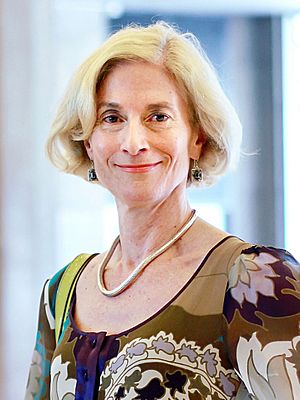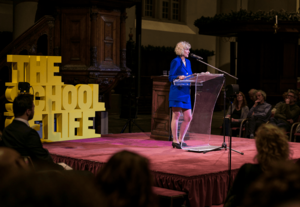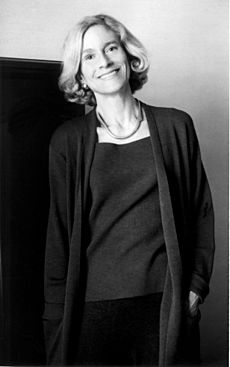Martha Nussbaum facts for kids
Quick facts for kids
Martha Nussbaum
|
|
|---|---|

Nussbaum in 2010
|
|
| Born |
Martha Craven
May 6, 1947 New York City, New York, U.S.
|
| Alma mater | New York University (BA) Harvard University (MA, PhD) |
|
Notable work
|
|
| Spouse(s) |
Alan Nussbaum
(m. 1969; div. 1987) |
| Awards |
|
| Scientific career | |
| Institutions | |
| Thesis | Aristotle's "DE MOTU ANIMALIUM" |
| Doctoral advisor | G. E. L. Owen |
| Notable students | Christine Korsgaard |
| Influences | |
| Influenced |
|
Martha Nussbaum (born May 6, 1947) is an American philosopher. Philosophers are thinkers who study big questions about knowledge, life, and what it means to be a good person. Nussbaum is a professor of Law and Ethics at the University of Chicago.
Her work explores ideas from ancient Greece and Rome, politics, and feminism (the belief in equal rights for women). She also writes about ethics, including the rights of animals. She has taught at famous schools like Harvard and Brown.
Nussbaum has written many books and won major awards for her work, including the Kyoto Prize in 2016 and the Berggruen Prize in 2018.
Contents
Early Life and Schooling
Martha Craven was born in New York City. Her father, George, was a lawyer, and her mother, Betty, was a designer. Growing up, she felt her community was too focused on money and social status. This made her want to dedicate her life to helping others and thinking about important issues.
She first went to college to study acting but soon switched to philosophy. She earned a Bachelor of Arts degree from New York University in 1969. She then went to Harvard University, where she received a Master of Arts degree and a PhD in philosophy.
A Career of Big Ideas
Nussbaum began her career teaching at Harvard in the 1970s. In 1986, she wrote a famous book called The Fragility of Goodness. This book explored how even a good person's life can be affected by bad luck. It made her well-known for her ideas on Greek philosophy and ethics.
After teaching at Brown University, she joined the faculty at the University of Chicago Law School in 1995. There, she continued to develop her ideas about justice and fairness for people around the world.
What is the Capability Approach?
One of Nussbaum's most important ideas is the Capability Approach. She developed this with another thinker, Amartya Sen. Instead of just asking how much money a country has, this approach asks, "What is each person actually able to do and be?"
Nussbaum believes that to live a dignified life, every person needs certain basic capabilities. She created a list of ten central capabilities that governments should help provide for their citizens. These include:
- Life: Being able to live a normal length of life.
- Bodily Health: Having good health, food, and a place to live.
- Bodily Integrity: Being safe from harm and able to move freely.
- Senses, Imagination, and Thought: Being able to think, reason, and use your imagination.
- Emotions: Being able to have feelings for others and things you care about.
- Practical Reason: Being able to decide for yourself what is good and plan your own life.
- Affiliation: Being able to live with and show concern for others.
- Other Species: Being able to live with concern for animals, plants, and nature.
- Play: Being able to laugh, play, and enjoy fun activities.
- Control Over One's Environment: Having a say in political decisions and being able to own property.
Nussbaum argues that a just society makes sure all its people have at least a basic level of these capabilities.
The Role of Emotions
Nussbaum has also written a lot about emotions. She believes emotions are not just random feelings. Instead, they are smart judgments we make about what is important to us.
For example, she argues that feelings like disgust and shame should not be used to make laws. She says these feelings can be unfair and lead to discrimination against certain groups of people. Instead of relying on these emotions, she thinks laws should be based on principles of fairness and preventing harm to others.
Personal Life
Nussbaum was married to Alan Nussbaum from 1969 to 1987. During their marriage, she converted to Judaism and had a daughter, Rachel. Nussbaum's Jewish faith is important to her, and she celebrated her bat mitzvah in 2008.
Her daughter, Rachel, worked as a lawyer for animal welfare. Sadly, Rachel passed away in 2019 from an infection after a transplant surgery. Together, they had written articles about protecting wild animals.
Major Books
Nussbaum has written many influential books that share her ideas with the world.
The Fragility of Goodness
This 1986 book looks at ancient Greek stories and philosophy. It asks if being a good person is enough to guarantee a happy life. Nussbaum concludes that it is not. She argues that luck plays a big role in our lives.
She says that accepting that we are vulnerable is key to living a good human life. The book was highly praised and helped make her a leading voice in philosophy.
Cultivating Humanity
In this book, Nussbaum argues for a type of education that teaches students to be "citizens of the world." She believes that studying different cultures and ideas helps us understand and respect others.
She encourages learning about different races, genders, and ways of life. She also thinks that reading literature is important because it helps us imagine what it's like to be in someone else's shoes. This, she says, makes us more compassionate and ethical people.
Hiding from Humanity
This book explores the emotions of shame and disgust. Nussbaum argues that these feelings should not be used to make legal judgments. She explains that people sometimes use disgust to look down on others.
She believes that using disgust to create laws is dangerous because it has been used to justify unfair treatment of groups like women and minorities. Instead, she argues for laws based on reason and equality.
Awards and Honors
Martha Nussbaum has received many awards for her work. She is a member of the American Academy of Arts and Sciences and the American Philosophical Society. She has also received dozens of honorary degrees from universities all over the world.
Some of her major awards include:
- 2002: Grawemeyer Award in Education for Cultivating Humanity
- 2012: Prince of Asturias Award for Social Sciences
- 2016: Kyoto Prize in Philosophy
- 2018: Berggruen Prize for philosophy and culture
- 2021: Holberg Prize for her important research in philosophy and law
- 2022: Balzan Prize for her work on social justice
See also
 In Spanish: Martha Nussbaum para niños
In Spanish: Martha Nussbaum para niños
- American philosophy
- List of American philosophers
- List of female philosophers
- List of animal rights advocates
- Nikidion
 | Aurelia Browder |
 | Nannie Helen Burroughs |
 | Michelle Alexander |



